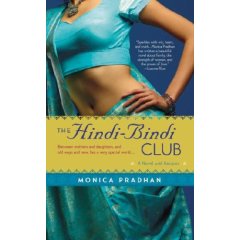 For a group of three mothers who left India to start life anew, living in the new world brings new experiences and presents new challenges. Their daughters, Kiran, Preity, and Rani, call their mothers “The Hindi Bindi Club,” also the name of Monica Pradhan’s novel about coming home, to a suburb of Washington D.C. for the holidays, to food, family, gossip and reflections.
For a group of three mothers who left India to start life anew, living in the new world brings new experiences and presents new challenges. Their daughters, Kiran, Preity, and Rani, call their mothers “The Hindi Bindi Club,” also the name of Monica Pradhan’s novel about coming home, to a suburb of Washington D.C. for the holidays, to food, family, gossip and reflections.
The mothers have remained close for decades, sharing treasured recipes, honored customs and the challenges of adjusting to a new world. Meenal Deshpande’s daughter Kiran returns home after a failed marriage that occurred despite her father’s disapproval. This will be her first trip home in five years. She arrives home craving tradition, wanting a family of her own, and wondering if a semi-arranged marriage is the answer.
Saroj Chawla’s daughter Preity is happily married with two delightful children. Most would describe it as the perfect life. But Preity is not haunted by the present. A past encounter with her soulmate is keeping her up at night, remembering and wondering.
Uma Basu McGuiness’s daughter Rani, is a rocket scientist-turned-artist, a career move which, while painful for her parents, has proven successful. Instead of celebrating her success with an opening night exhibition on the horizon, she is drowning in depression, her creative juices having run dry.
For Kiran, Preity and Rani, adulthood bears the indelible stamp of their upbringing, from the way they tweak their mothers’ cooking to suit their western lifestyles to the ways they reject their mothers’ most fervent beliefs. Now they are inexorably drawn back home to confront the disappointment and successes of their chosen paths and to question whether they have the courage to hold on to their dreams and create new ones.
Most of all, what stands out about this novel is the use of proverbs or sayings to initiate the reader to each chapter. For instance, the chapter titled “Rani McGuiness Tomashot Reincarnation” is introduced with the renowned saint Kabir’s “doha” or saying: “A diamond was laying in the street covered with dirt. Someone who knew diamonds picked it up.” This is a wonderful way of enlightening readers by presenting them with the profound thoughts of spiritual gurus while associating with it a story or an anecdote, to motivate them to reflect on the idea.
Similar to Like Water for Chocolate and The Joy Luck Club, this novel attempts to talk about two or more generations of a culture influenced by immigration and westernization. Peppered with recipes to enthuse the reader, this debut novel from a financial manager turned writer, is a pleasant, light read which reflects themes of family, women, culture and the influence of love on life and the soul.
Review written by Visi Tilak, an award winning writer based in Ashland, MA.


